Redditor Gets Told Off By A Customer With A Service Dog After Informing Her That There's A Reactive Dog In The Store
The presence of service dogs is becoming increasingly common in public spaces. People with service dogs may be more visible than ever before as their needs become more widely understood.
However, this increased visibility can also bring challenges. People may feel compelled to offer help, which can be irritating to the service dog user.
After all, they got their service dogs to be more independent, not to be in the spotlight and receive pity stares. Today, we have one of those stories.
OP, a 21-year-old cashier at a pet-friendly store, often observes customers entering the store with off-leash dogs, which is against store policy unless the animal is unruly. As the cashier, they are usually the first to greet customers and their pets.
When a customer with a service dog enters at the same time as an off-leash dog, OP has made a habit of informing the service dog user of the situation to ensure their safety.
Recently, OP was at the register when a couple with a young, hyper puppy on a very long leash came in. After a few minutes, a service dog user entered the store, and the puppy began barking and lunging toward the service dog.
OP called for register backup, which the service dog user heard, and then proceeded to slam their items on the counter and demand that the cashier hurry up. The user then left in an annoyed manner.
OP is left wondering if they instigated the situation by informing the service dog user and if they were in the wrong for doing so.
OP asks:

OP, a 21-year-old cashier at a pet-friendly store, often observes customers entering the store with off-leash dogs
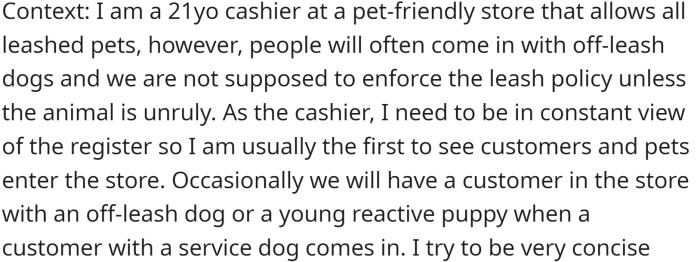
So they warn people with service dogs about reactive dogs in the store

Understanding Service Animals and Social Dynamics
Service animals serve vital roles in supporting individuals with disabilities, yet their presence can evoke mixed feelings among the general public. Research from the Journal of Disability Policy Studies suggests that societal attitudes toward service animals can significantly influence how these interactions unfold.
When individuals feel the need to intervene, it often stems from a protective instinct but can sometimes lead to misunderstandings.
Navigating the Complexities of Service Dogs
Service dogs play a crucial role in supporting individuals with disabilities, often serving as a lifeline to independence and quality of life. According to a study published in the Journal of Applied Animal Welfare Science, these dogs are trained to perform specific tasks that mitigate their owner's disability, which underscores their essential function in everyday life.
When a service dog is present, it’s vital for bystanders to recognize the importance of this relationship and act accordingly, as disruptions can adversely affect both the handler and the service dog.
The incident:

One woman with a service dog didn't like this approach

OP tried to be helpful, irritating the woman even more

Communication style plays a crucial role in these situations. According to a study published by the American Psychological Association, non-verbal cues are often misinterpreted, leading to unnecessary conflict.
Understanding the nuances of these interactions can help individuals respond more appropriately and with greater empathy.
Dr. Stanley Coren, a canine psychologist, argues that the presence of a service dog can significantly alter social dynamics. His research indicates that service dogs can help reduce the stigma associated with disabilities, fostering greater acceptance and understanding in public spaces.
This highlights the need for empathy and support from the public, particularly in busy environments where service dogs are often required to navigate complex social interactions.
She stormed out of the store

Now OP feels bad

They posted an edit:
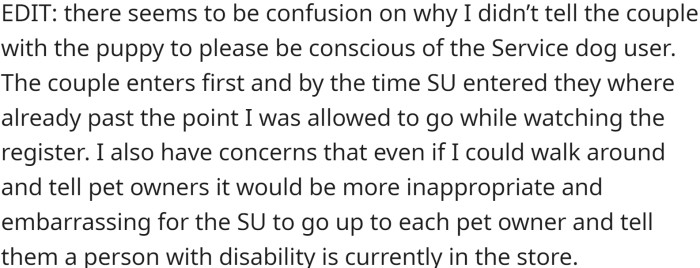
The Impact of Social Perception
Social stigma surrounding service animals can lead to heightened tensions. Research indicates that people have preconceived notions about the roles of these animals, which may not align with the actual needs of service animal handlers.
Addressing these misconceptions through education can foster a more supportive environment for everyone involved.
The Importance of Public Awareness and Education
Raising awareness about the roles and rights of service dogs is crucial for creating a supportive environment. Research shows that many people are unaware of the specific laws and regulations governing service animals, which can lead to misunderstandings and conflict.
Educational initiatives aimed at informing the public about the importance of service dogs can foster a culture of respect and understanding, reducing instances of confrontation.
Edit 2:

OP has offered the following explanation for why they think they might be the a-hole:

Probably just having a bad day...

Empathy and understanding are vital in navigating these complex social dynamics. Studies show that individuals who can put themselves in others' shoes are more likely to respond constructively.
This perspective can help de-escalate situations and promote positive interactions between service animal handlers and the public.
In situations where reactive dogs are present, communication becomes essential. Experts suggest that informing the service dog handler about potential triggers can help prevent stressful encounters.
This is not only a courtesy but also aligns with best practices in animal behavior management, ensuring a safer experience for everyone involved.
Or maybe this:

This Redditor has a service dog and they would appreciate the heads up
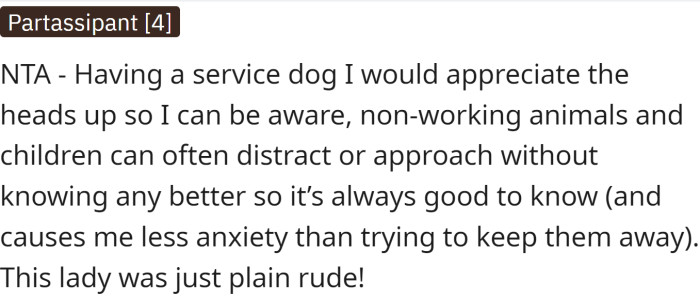
OP replied and asked some good questions:

Best Practices in Public Interactions
When encountering a service animal in public, it can be beneficial to adopt a mindset of respect and caution. Experts recommend that individuals refrain from approaching or petting service animals without explicit permission, as this can distract them from their duties.
By fostering an understanding of these boundaries, we can create a more inclusive atmosphere for individuals with disabilities.
Empathy as a Tool for Social Interaction
Empathy is a powerful tool in navigating interactions involving service dogs. Studies show that individuals who exhibit higher levels of empathy are more likely to respond positively to those with disabilities, fostering inclusivity.
Dr. Brené Brown emphasizes that empathy involves understanding and relating to the feelings of others, which is especially important when interacting with individuals relying on service animals for support.
And Redditor replied:
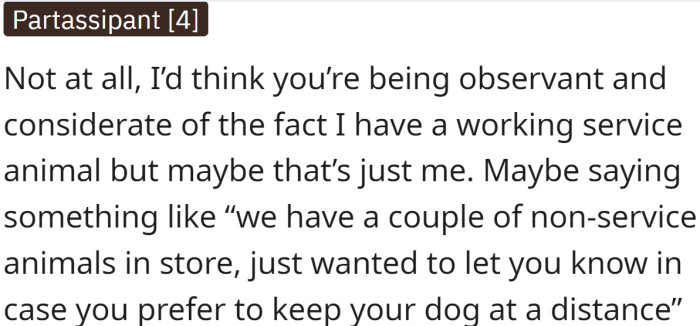
"Sounds like she was crabby"
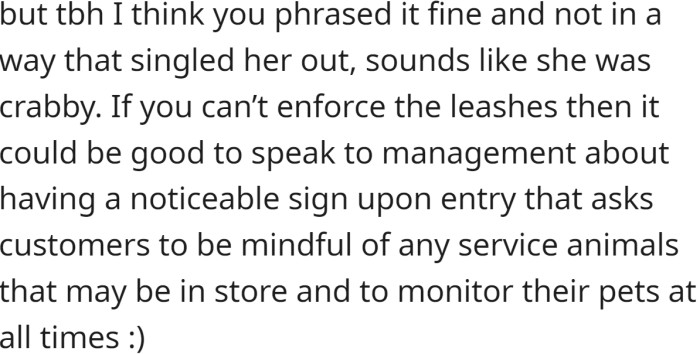
OP wanted to know more:

Additionally, education about the specific needs of service animals can help bridge the gap between the public and those in need. Workshops and community programs can provide valuable insights into the roles of service animals and how to interact respectfully.
These initiatives can help demystify the purpose of service animals, reducing barriers to understanding.
Moreover, the emotional bond between a service dog and its handler is profound and is often built on mutual trust and reliance. Understanding this bond can help others appreciate the significance of maintaining a calm and respectful environment.
Recognizing that service dogs are not just pets but vital partners can change the way we perceive and interact with them in public spaces.
OP did nothing wrong

Another Redditor with a service dog shares their thoughts:
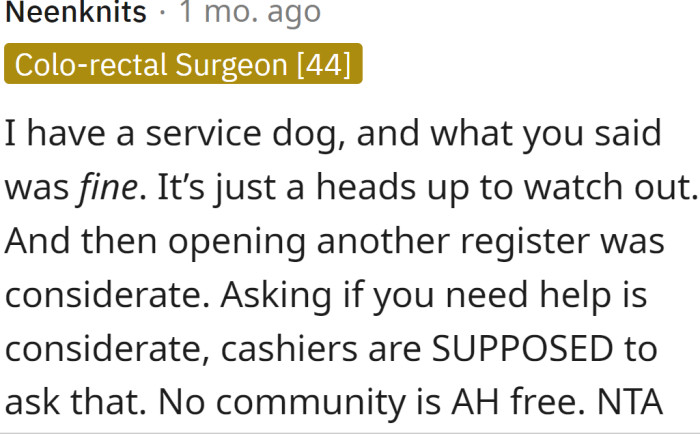
The bottom line is - she should learn from her service animal

Building Awareness and Compassion
Promoting awareness about the importance of service animals is crucial for fostering societal change. Engaging in community discussions or campaigns can help normalize the presence of service animals in public spaces.
By showcasing the benefits of these animals, we can encourage a culture of compassion and respect, ultimately benefiting everyone.
Practical Solutions for Managing Service Dog Interactions
To facilitate smoother interactions, individuals are encouraged to think proactively. Carrying informational cards that explain the role of the service dog can help educate bystanders and reduce misunderstandings.
Additionally, training programs for service dog handlers on how to advocate for their needs in public can empower them to navigate tricky situations more effectively.
Service dogs are becoming increasingly common in our society as more and more people discover the benefits that these amazing animals provide. Service dogs are specially trained to assist people with disabilities, both visible and invisible.
For people with physical disabilities, a service dog can provide invaluable assistance with everyday tasks. They can open doors, pick up dropped items, and even help a person move from one place to another.
For people with invisible disabilities such as autism, PTSD, or seizure disorders, a service dog can provide a calming presence, help keep their handler safe, and even provide tactile comfort during times of stress.
Ultimately, fostering an environment of respect and understanding around service dogs requires a collective effort. By increasing public awareness and promoting empathy, we can create a more inclusive society for everyone, especially those who rely on service animals for support and companionship.
Recognizing the challenges faced by service dog handlers can lead to better social interactions and a more supportive community.
Psychological Analysis
This scenario illustrates the delicate balance between being helpful and respecting the needs of those with disabilities. The presence of reactive dogs can create anxiety for service dog handlers, and it’s essential to approach these situations with understanding. Recognizing the stress these interactions can cause allows us to foster more respectful public spaces.
Analysis generated by AI
Analysis & Alternative Approaches
In conclusion, interactions involving service dogs highlight the need for ongoing public education and empathy. Understanding the vital role of service dogs can foster more inclusive environments, ensuring that both handlers and animals feel supported and respected.
As we navigate these complex social dynamics, prioritizing compassion and awareness will create better experiences for everyone involved.
Analysis & Alternative Approaches
In summary, understanding the role of service animals within society requires empathy and education.
By fostering respectful interactions and challenging misconceptions, we can create a more inclusive environment for all individuals.



